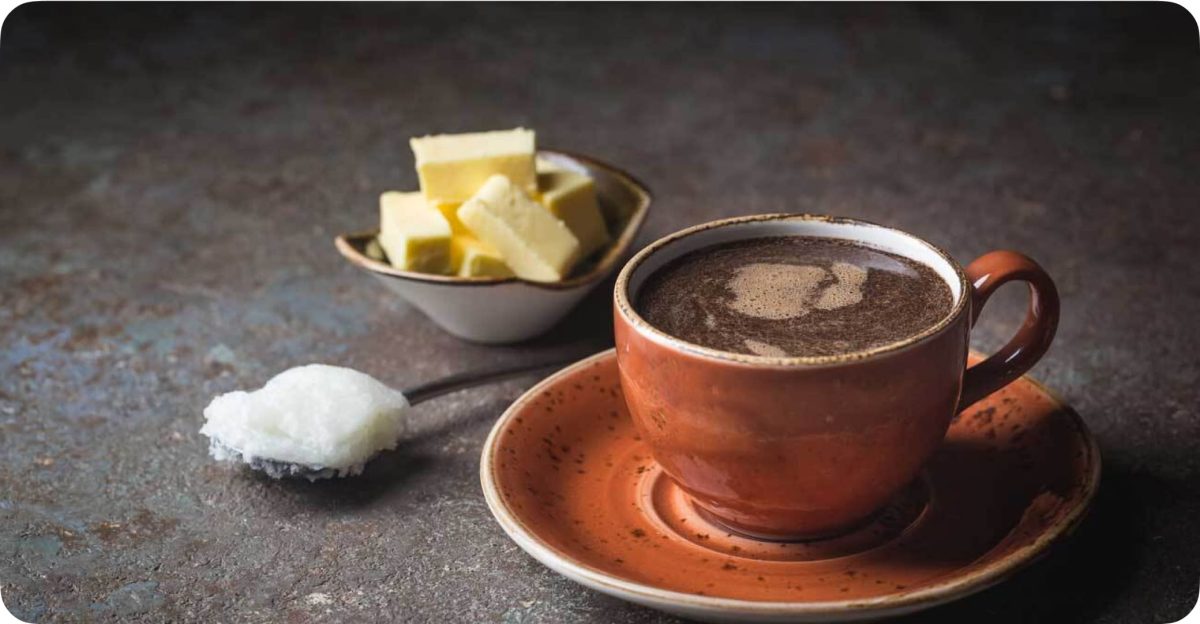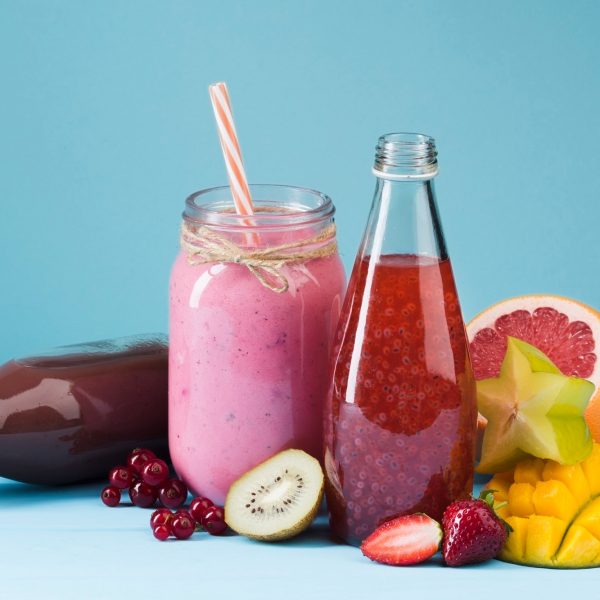Welcome
to the
latest
edition of
Healthwatch!
In this
issue, we
embark on
an
exciting
journey to
decipher
the truth
behind the
buzzworthy
health and
wellness
trends
that are
taking the
world by
storm.
With
social
media’s
influence,
it’s easy
to get
caught up
in the
latest
fads, but
do these
trends
stand up
to
scientific
scrutiny?
Join us as
we delve
into five
popular
trends –
from the
enigmatic
allure of
bulletproof
coffee to
the
promise of
better
sleep with
supplements,
the
protein
craze, the
rise of
continuous
glucose
monitoring,
and the
chilling
truth
about ice
baths.
Prepare to
discover
the
evidence-backed
reality
behind
these
trends and
make
informed
decisions
for a
healthier
life!
|
|
What’s
the first
thing that
comes to
mind when
you think
of butter?
Maybe it’s
crispy
toast or
hot
parathas?
Definitely
not
coffee,
right? A
new health
trend
claims to
keep
hunger at
bay and
increase
energy
levels by
mixing 3
contradictory
ingredients.
|
|
|
What is
Bulletproof
coffee?
|
Also
known as
butter
coffee or
keto
coffee, it
comprises
coffee,
oil, and
butter.
The
recipe’s
original
source is
the
Bulletproof
Health
Blog,
and the
steps to
make it
appear
straightforward.
Blend 1
cup of
black
coffee
with 1
Tbsp of
medium-chain
triglyceride
(MCT) oil,
for
example,
coconut
oil, and 1
to 2 tbsp
of
unsalted
butter or
ghee.
|
|
Promoters
of
bulletproof
coffee
assert
that it
offers
several
advantages.
It’s
popularity
also comes
from the
fact that
the added
fats help
reduce the
acidity
from the
coffee.
However,
doesn’t
adding fat
to our
morning
coffee
seem
counterintuitive?
Unfortunately,
there
isn’t any
scientific
evidence
to support
or
discredit
butter
coffee
since it’s
such a new
concept.
Here are
some
potential
benefits
and the
scientific
reasoning
provided
by those
who’ve
tried and
tested
this
drink.
|
|
-
Increased
energy:
While caffeine is a potent
stimulant that can
increase your energy,
supporters of bulletproof
coffee claim that caffeine
is not the only factor in
this beverage’s ability to
improve your energy levels
in the morning.
MCT oil can also raise
your energy levels, making
it a potent complement to
caffeine. How does this
work? Dietary fats are
typically stored in the
adipose tissue surrounding
your muscles. However, MCT
travels straight to your
liver, where it is
converted into potent
energy molecules known as
ketone bodies. Since
medium-chain triglycerides
digest faster than
different types of fats,
they might result in more
frequent bursts of
energy.
-
Stabilized blood sugar
levels:
Based on hormones, and
frequency of meals, our
body chooses to burn
either glucose or fatty
acids to energize itself.
So, given the fact that
consumption of fats raises
insulin very little,
butter coffee can be
really helpful in
stabilizing blood sugar
levels.
-
Reducing hunger
pangs:
MCT oil may encourage the
release of hormones that
alert your brain when your
stomach is full, which can
decrease your appetite and
cause you to eat less
(which may result in
weight loss).
-
High-calorie
content:
One cup of bulletproof
coffee can contain between
230 and 500 calories,
depending on how it is
made.
-
High in fats:
Butter and coconut oil are
rich in saturated fats.
Increased LDL cholesterol
levels, also called “bad”
cholesterol, and an
increased risk of heart
disease are both caused by
excessive consumption of
saturated fats. However,
your daily intake of
saturated fats is based on
your overall diet, wherein
1-2 tsp of ghee proves to
be good for your HDL
cholesterol levels.
|
Considering
that 62%
of adults
worldwide
say they
don’t
sleep as
well as
they’d
like
(Philips
Global
Sleep
Survey)
and as
many as
67% report
sleep
disturbances
at least
once a
night, the
popularity
of sleep
supplements
is not
surprising.
|
|
Melatonin
is a
hormone
produced
by our
bodies in
response
to
darkness.
This is
responsible
for
maintaining
our
circadian
rhythm,
the
24-hour
sleep-wake
cycle that
governs
when we
wake up,
feel
alert,
feel
tired, and
sleep.
|
|
|
Here’s how
melatonin
works in the
body:
|
Our
bodies
organically
produce
melatonin
to help us
fall and
stay
asleep.
Interestingly,
this
hormone is
only
released
at night
(when it’s
dark), and
its levels
tend to
rise just
before
bedtime.
In
addition
to making
you feel
sleepy,
melatonin
levels in
the blood
remain
elevated
for about
12 hours
until it
is time
for
daylight
again.
But why
do some
people
have lower
levels of
this
hormone?
It can be
brought on
by various
things,
including
consumption
of alcohol
&
caffeine,
smoking,
working in
shifts,
ageing,
specific
medications,
and
exposure
to
excessive
nighttime
light as
well as
blue
light.
|
|
|
Are
melatonin
supplements
safe?
|
For most
people,
yes.
Supplementing
with
melatonin
is safe
over the
long term
because it
is
non-toxic
and
non-addictive.
Melatonin
has fewer
side
effects
than many
other
sleep
aids,
including
dependence,
diminished
effectiveness
after
repeated
use, and
hangover
effects.
Studies
have shown
that daily
melatonin
doses of
2-10 mg
for up to
3.5 years
have not
been
linked to
any
serious
adverse
events.
There is
no
evidence
that
melatonin
supplementation
affects
your
body’s
ability to
produce
its own,
in
contrast
to other
hormones.
Finally,
since
there are
no serious
adversities
recorded
from the
consumption
of
melatonin
supplements,
it can be
helpful to
many. But
in case
your sleep
requirements
aren’t
being met
over a
long
period of
time, we
recommend
you
consult
your
doctor.
|
|
|
While the
market for
protein
supplements
steadily
expands
each year,
it is
evident
that
integrating
protein
powder
into many
diets is a
trend that
will be
around for
a
while.
|
|
|
What are
protein
supplements?
|
Protein
supplements
are made
by
extracting
protein
from
plant- or
animal-based
sources,
including
peas,
rice, soy,
cow’s
milk, and
eggs. The
most
common
protein
powders
are whey,
plant-based,
egg or soy
protein.
|
|
|
How does
protein
powder
help?
|
One of
the most
common
benefits
of protein
powder is
that it
helps
build
muscle
tissue and
muscle
mass. It
also
assists in
healing
injured
muscles
and
tissues,
in
addition
to helping
muscles
grow.
Using
these
supplements
after
exercise
has been
shown to
improve
muscular
performance,
reduce
muscle
damage,
and speed
up
healing.
Beyond
muscle
growth,
these
supplements
can also
be crucial
in weight
management.
Protein-rich
diets are
known to
increase
metabolism
and enable
appropriate
fat
storage
and
burning.
Also,
eating a
meal high
in protein
makes you
feel
fuller for
longer.
Thus,
including
protein
powder in
a meal may
aid in
weight
loss and
decrease
the amount
of total
body
fat.
|
|
|
Are protein
supplements
necessary?
|
While
protein is
a vital
nutrient
that we
can’t live
without,
the
question
arises,
are these
supplements
as
necessary
as we’re
led to
believe?
The
answer
depends on
your
dietary
choices.
It is
generally
easy for
most
people to
consume
the
recommended
amounts of
protein
through
their
regular
diet, so
supplementing
may not be
necessary.
The
Recommended
Dietary
Allowance
(RDA), or
the amount
deemed
sufficient
for the
majority
of healthy
individuals,
is set at
0.8 grams
per
kilogram.
This means
a person
weighing
roughly 70
kilograms
(154
pounds)
would
require 56
grams of
protein
per
day.
Consider
this – A
small
handful of
nuts, one
egg, and
one-half
cup of
chickpeas
all
contain
about 6
grams of
protein. A
piece of
chicken or
fish the
size of
the palm
of your
hand
offers
approximately
30 grams.
So, if you
have the
time to
plan your
meals and
include
the right
amount of
protein,
you don’t
need to
consume
supplements.
Studies
have also
demonstrated
that
high-protein
diets with
and
without
protein
supplements
were
equally
effective,
indicating
that the
advantages
of protein
supplements
are their
convenience
and ease
of
consumption.
So, if
your
schedule
doesn’t
allow you
to
incorporate
the right
amount of
protein
into your
meals,
mixing a
spoonful
of protein
powder
into a
milkshake
might be
the right
choice.
|
|
Taking a
protein
supplement—which
may
contain
protein,
caffeine,
and other
ingredients—and
swallowing
it dry
rather
than
mixing and
diluting
it in
water is
known as
“dry
scooping.”
This
practice
is
followed
by a glass
of
water.
Why would
someone
want to do
this? The
reason
behind the
craze is
that dry
scooping
is said to
give you a
more
significant
energy
boost,
enabling
you to
exercise
harder and
longer. Is
there any
truth to
this? No!
Not only
does it
pose a
risk of
choking,
but it
could also
lead to
increased
blood
pressure
and heart
rate. It’s
safe to
say, skip
this
trend.
|
|
|
|
Continuous
Glucose
Monitoring
(CGM)
|
Many of
us monitor
our blood
pressure,
heart
rate,
weight and
steps per
day via
the latest
technological
devices.
But what
about
blood
sugar?
Would you
keep track
of your
blood
glucose
levels
throughout
the
day?
|
|
A CGM is
a small
medical
device
that
continuously
measures
your blood
glucose
levels,
usually
with a
5-minute
gap
between
readings.
Most CGMs
can send
alerts
when your
blood
sugar
levels are
too high
or too
low.
|
|
|
What are
the benefits
of
CGM?
|
CGMs have
fundamentally
changed
how
diabetes
is managed
since they
provide
continuous,
dynamic
glucose
information
every few
minutes,
unlike
traditional
fingersticks
(blood
glucose
meters),
which only
provide a
single
glucose
reading.
This is
equivalent
to
approximately
288
readings
per
day.
How do
these
increased
readings
help?
|
|
-
Better glycemic control
*
If you’re living
with diabetes, a CGM
device can help you choose
your treatments more
wisely, thanks to
continuous feedback on
your diet, exercise, and
insulin needs. This
awareness can result in
more stringent glycemic
control than using a blood
glucose meter alone. CGM
can provide helpful
information at critical
times during the day, such
as before and during
physical activity, before
driving, ahead of a trip
or essential event, and
even in the middle of the
night.
*
Glycemic
control
refers
to
the
typical
blood
sugar
(glucose)
levels
in
a
person
with
diabetes.
|
|
|
-
Quick and proactive
action
With some CGM
devices, you can set
individualized thresholds
that send alerts when your
readings stray from the
desired range. This means
you could be aware of your
out-of-range status before
you start experiencing
symptoms, allowing you to
take proactive
action.
|
Should you
use a CGM
device if
you don’t
have
diabetes?
|
While
CGMs are
obviously
helpful
for
diabetics,
why should
someone
who
doesn’t
have
diabetes
keep track
of their
blood
glucose
levels?
Well, they
probably
don’t need
to.
One of
the
functions
of CGMs is
to warn a
person
with
diabetes
or on
diabetes
medications
when
concerning
thresholds
are
reached,
but these
limits
don’t mean
much for a
healthy
person. In
fact, it
is
completely
normal for
a healthy
person to
have some
spikes
& dips
in their
blood
sugar, and
interpretation
of CGM
based data
should be
done only
by a
trained
physician
for such
people.
There is
no
evidence
or study
yet that
shows
blunting
blood
sugar
spikes
does
anything
for our
health
amongst
healthy
individuals.
Continuously
tracking
your
body’s
sugar
levels,
without
knowing
what
exactly it
means, or
what
action to
take,
causes
further
anxiety
and can
often lead
to bad
decision
making –
say having
a high
carb
packet of
chips
because
you’re
alerted by
your
device of
a dip,
which
could be
perfectly
normal.
|
|
|
Celebrities
and
athletes
are
increasingly
embracing
ice baths
to deal
with
muscle
soreness,
anxiety,
decrease
inflammation,
and
improve
metabolism.
While
the
connection
between
freezing
water and
these
health
benefits
appears
far-fetched,
there is
initial
evidence
to
validate
some of
these
claims.
|
|
|
What are
the benefits
of an ice
bath?
|
|
-
Pain management &
tackling muscle
soreness:
The theory behind ice
baths is that by lowering
body temperature, there is
a reduction in blood flow,
swelling, and inflammation
in the muscle tissues.
Inflammation in the body
can cause pain, so if you
can reduce inflammation,
you may be able to reduce
overall pain; it follows
the same logic as icing a
sprained ankle.
-
Improved mood:
Studies
have found that submerging
your body in cold water
elevates dopamine
concentrations in the
brain by 250%. Because of
the critical function it
performs in controlling
mood, dopamine is called
the “feel-good” hormone.
Additionally, it improves
mental clarity and
alertness throughout the
day.
Frostbite
and
hypothermia!
Extreme
heat or
extreme
cold
exposure
for an
extended
period may
harm the
body.
Spending
more than
15 minutes
in an ice
bath can
be
dangerous.
Also, ice
baths can
be
painful.
While this
isn’t
necessarily
a risk, it
is
essential
when
deciding
whether to
try an ice
bath.
Lastly,
people who
suffer
from
cardiovascular
disease
should
avoid ice
baths
because
immersion
in cold
water
raises
blood
pressure
and puts
more
strain on
the heart.
This can
be risky
for those
with heart
issues
because it
can
occasionally
result in
life-threatening
irregular
heartbeats.
|
|
Whether
you’ve
just
started on
a journey
to better
health or
been on it
for a
while,
it’s easy
to get
swayed by
the sheer
popularity
of some
emerging
health and
wellness
concepts.
But it’s
important
to
remember
that not
all are
well-researched
or
scientifically
validated.
Contradictory
arguments
make the
decision
challenging.
Our
suggestion?
Before
trying
something
new,
consider
your
health
status,
fitness
goals, and
dietary
restrictions,
and couple
this with
the
scientific
understanding
of a new
trend.
|
|
|
|
Want to
help someone
who is
looking to
try new
health
innovations? Share
this article
with
them.
|
|
|
|
|
|
|











Share this article